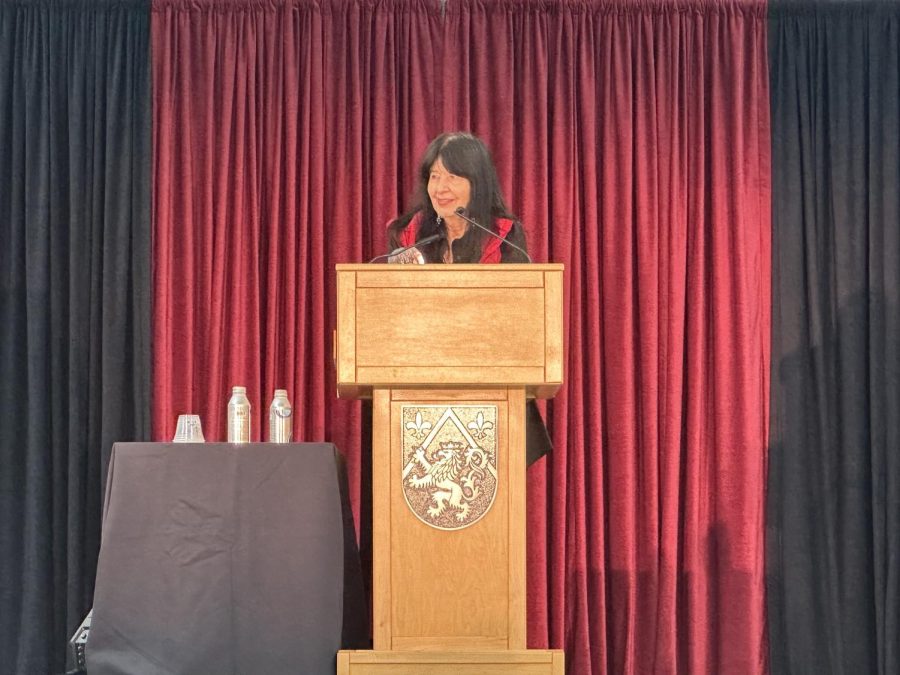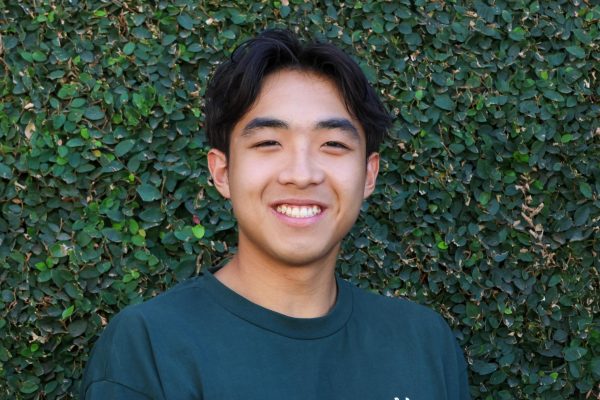U.S. Poet Laureate Joy Harjo speaks at Brown Family Speaker Assembly
Joy Harjo, the Brown Family Speaker, speaks to students at an assembly.
February 23, 2023
Three-consecutive-year U.S. Poet Laureate, author and songwriter Joy Harjo recited poetry and spoke at this year’s Brown Family Speaker Assembly on Feb. 16.
Founded by Linda Brown and Abbot Brown (Russell ’94 and David ’96) 21 years ago, the Brown Family Speaker Assembly is an opportunity for the school community to hear from a distinguished speaker or panel, according to President Rick Commons.
In 2019, Harjo became the 23rd U.S. Poet Laureate, a position she held for three years, according to joyharjo.com. She was also the first Native American to be named the U.S. Poet Laureate.
Harjo began her speech with a poem called “For Calling the Spirit Back.” Harjo said the poem was written to help people restore their lost spirit.
“We all go through times in our lives, our individual lives, the lives in our community [and] sometimes in your school, which is a community,” Harajo said. “Your generation is a community or a kind of person and [if] we feel like we lost our sense of direction or our spirit, this poem was written to help call that spirit back.”
Growing up in Tulsa, Oklahoma, Harjo attended Tulsa public schools until she received the opportunity to attend the Institute of American Indian Arts (IAIA). Harjo said her origin story of writing poetry began when she enrolled at IAIA in 1967.
Harjo said poetry became a means of expression for herself and helped her form her own creative story.
“Poetry became a way to actually live [and to] find that there were words in other people’s poetry, reading poetry, but also making it within,” Harajo said. “At some point in transit, it became my art, but there’s even an art in that. We’re in a creative universe and our charge being here is to be creative. And to learn to be creative, you have to be yourself … I call this the story field. Everybody’s making a story.”
Harjo said she advises aspiring poets to be confident and spirited in their creative processes.
“[My advice would be] to trust themselves and just feed the poetry spirit,” Harjo said. “That means with your thoughts and reading, looking at what’s going on in the world and research.”
Brielle Lubin ’24 said Harjo’s poetry book, An American Sunrise, was written with a unique, personal tone.
“[Harjo] uses ‘we’ a lot, [which] sort of brings the reader into the poem,” Lubin said. “The pronouns she uses, it’s never really about herself. She tries to bring you into the poem. So it really makes it this is, ‘I am reciting this, I’m speaking this, I’m writing this poem for you.’ I think American sunrise is the best example of what she can do with poetry structure and language and just incorporating it into her own life.”
Co-leader of Slam Poetry Club Fernanda Herrera ’23, who introduced Harjo during the assembly, said Harjo’s work has impacted her perspective on literature and has also had a profound impact on the creative community as a whole.
“I’m a big poetry fan so I absolutely loved her poetry,” Herrera said. “Getting to hear her speak them was incredible and a dream come true. I think so much of her poetry is effective because it conveys a level of kindness not often found in literature, which was the most impactful part of her speech for me … I think that her poetry has changed the way a lot of people choose to write about their pain. She [has] also integrated poetry and music, which I think has provoked a lot of artists [and] poets to add rhythm and sound to their writing.”






























